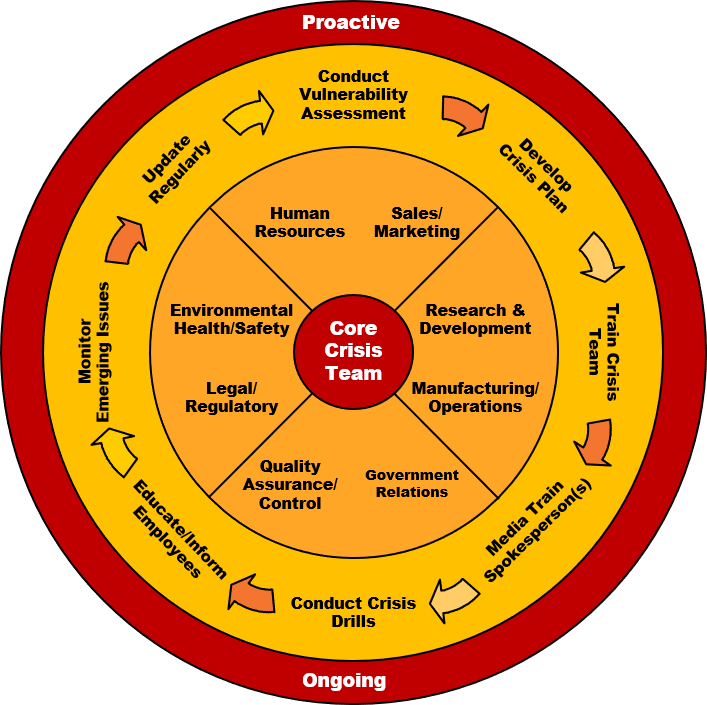In this age of instant communication, to say “bad news travels fast” is an understatement. So when a food safety crisis hits — or any situation that calls into question your people, product or reputation — it’s essential to respond immediately. Advance preparation is critical.
The almond industry continues to be a leader in food safety, owing to vigilance on emerging science and on-the-ground best practices. The Almond Board of California (ABC) hosted the 20th Annual Quality & Food Safety Symposium in Modesto this year, covering hot topics from phosphine resistance among insects to tools for aflatoxin control to the nutritional content of almond biomass. But no session got more hearts pounding than that on crisis management given by Daren Williams, ABC’s senior director of Global Communications.
According to Williams, there's no one-size-fits-all method to remedy a company crisis, but there are lessons to be learned from past successes and failures. “You can turn a crisis situation into a positive situation for the industry,” said Williams, before he harkened back to the Farmland Industries oil spill as a case-in-point from early in his career at a public relations firm in Kansas City. Back in 1998, a pipeline ruptured, sending hundreds of barrels of crude oil into the Verdigris River in southeastern Kansas and potentially impacting Tulsa’s water supply as well as that of the surrounding area.
Farmland’s response epitomized crisis management best practices:
- Do the right thing. Farmland swung into action immediately to clean up the spill. Anticipating the spill’s short-term impact on the municipal water supply in the affected area, Farmland arranged for trucks to haul water from nearby cities to the small town of Nowata, Oklahoma, which was forced to shut off its water intake from the river. As residents watched newscasts predicting that they would have “no water in Nowata,” a convoy of Farmland trucks arrived with thousands of gallons of water to replenish the city water tank.
- Focus on your intent and core values. “Proud to be farmer-owned” was not just Farmland’s tagline, it was a way of doing business. Farmland’s messaging emphasized that its concern wasn’t the cost of the cleanup, or possible fines, but helping those affected by the spill.
- Commit to fixing the problem. Farmland stated from the outset that it would conduct a round-the-clock cleanup operation until authorities gave it the all-clear, regardless of the time or money needed to finish the job.
- Communicate early and often. Farmland and its public relations firm established an on-site communications center, which facilitated efforts to distribute daily press releases, participate in dozens of media interviews, and get the word out to community leaders. These days, social media is an essential tool for proactively updating your audiences.
- Never lie or mislead; the truth will come out! Farmland accepted responsibility from the outset, a key component of an effective response, according to Williams. Other companies — for example, Volkswagen in the wake of the emissions scandal — have learned this the hard way.
“No matter how robust your quality and safety practices, the reality is things don’t always go according to plan,” Williams said. The good news is, you can take these simple steps to make sure you’re prepared:
- Conduct a vulnerability assessment. Ask yourself, “What’s possible, what’s probable and what keeps you up at night?”
- Develop a crisis communications plan
- Train the crisis team
- Conduct media training for spokespersons
- Hold a crisis drill (or traceability exercise). Be sure to test your communications plan in addition to your operational plan.
- Educate/inform all employees of their roles
- Monitor emerging issues
- Update your crisis plans at least once per year
If something does go wrong, remember the 4 Rs of crisis communications:
- Regret – It never hurts to say you are sorry.
- Responsibility – Take responsibility for fixing the problem.
- Reform – Take appropriate steps to make sure it doesn’t happen again.
- Restitution – Make it right by those affected (for example, bring water to the people of Nowata).
While the Almond Board manages emerging issues at the industrywide level, every member of the industry needs to be prepared to tell their own story in the event of an incident. ABC offers preparedness resources and is available to provide counsel to both growers and handlers. Contact Williams at dwilliams@almondboard.com for assistance.

